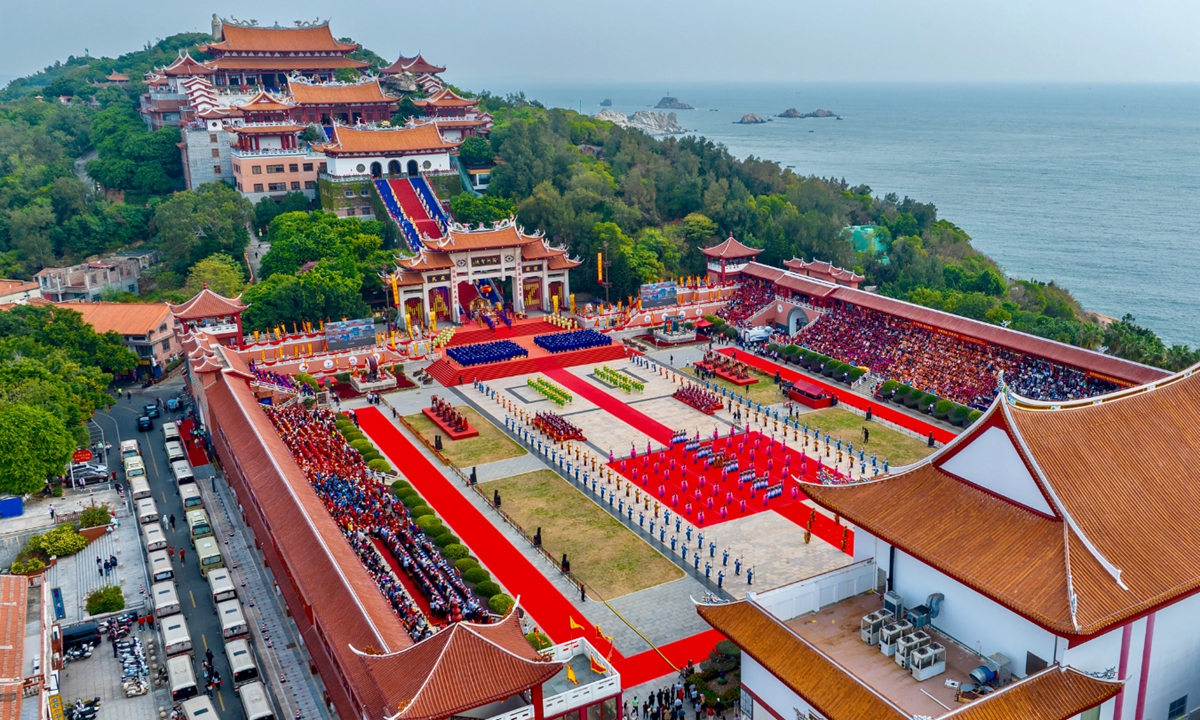
The 27th Meizhou Mazu Culture and Tourism Festival kicks off on Meizhou Island in Putian, East China's Fujian Province. Photo: VCG
The 10th Global Mazu Culture Forum was held on Sunday on Meizhou Island in Putian, East China's Fujian Province - the birthplace of Mazu, China's revered sea goddess. For the first time, the forum featured 11 sub-venues spanning five continents, underscoring its role as a global platform for cultural exchange and dialogue. During the forum, leaders from 16 nationally protected Mazu temples gathered in Putian for the first time to discuss how digital technology can be leveraged to coordinate the conservation of Mazu cultural heritage and ensure the continuity of traditional rituals.
At the main venue on Meizhou Island, guests from 32 countries and regions assembled, with live feeds connecting to the sub-forums worldwide. This demonstrated the expanding "international circle of friends" formed around Mazu culture. As former Swedish prime minister Stefan Löfven remarked in a video address, "Mazu's spirit of compassion and protection speaks to values we all share - peace, harmony, and respect among peoples. For Sweden, a nation long shaped by the sea, these values remind us that across cultures and continents, we are bound by a common destiny."
Gitau Recheal Mugure, a Kenyan student who has lived in China for six years, told the Global Times that she was deeply moved by the grandeur of the Mazu ritual on Meizhou Island and became intrigued by its cultural significance. She was particularly touched by the core values of great love, harmony, and peace embedded in Mazu culture. Mugure expressed her desire to bring these values and cultural heritage back to her distant homeland, sharing the spirit of Mazu with more of her compatriots.
For centuries, Mazu culture has spread along the Maritime Silk Road, leaving a rich legacy both in China and abroad. In 2009, Mazu belief and customs were inscribed on the UNESCO Representative List of the Intangible Cultural Heritage of Humanity, becoming China's first world heritage in the category of folk beliefs.
Mazu temples are not only vital carriers of the culture but are also integral to its heritage. Zhuang Qinggui, deputy director of the construction office of the Meizhou Mazu Ancestral Temple, noted at the forum that advanced technologies are now used to survey and archive ancient temple complexes and over a dozen precious cliff inscriptions in the surrounding area. Restoration work adheres strictly to the principles of original materials, craftsmanship, and forms. At the same time, the temple continues to train a new generation of ritual masters and performers in accordance with traditional practices.
Thanks to the careful preservation and dedication of several generations, overseas youths like Mugure now have the opportunity to experience the essence and beauty of Mazu culture and are voluntarily becoming its ambassadors.
In addition to discussions on digital innovation and youth engagement in preserving Mazu culture, the forum also featured the official naming ceremony for China's first ocean wind and wave detection satellite "Mazu." The release of an AR-enhanced stereoscopic book and the "Meizhou Declaration of the 10th Global Mazu Culture Forum" were also highlights.
The declaration called for Mazu culture to serve as a bridge uniting the global Chinese community into a "cultural community." It urged Mazu cultural institutions worldwide to jointly build transnational public welfare networks and launch the Mazu public welfare initiative, collaborating to address global challenges such as climate change, maritime security, and public health. The declaration advocates for a shared, comprehensive, cooperative, and sustainable approach to security, and calls for Mazu culture to become an important vehicle in promoting global harmony and coexistence.

Copyright © General Office of Fujian Provincial People's Government
Website Identification Code 3500000049Registration Number: 15003084
All rights reserved. The content (including but not limited to text, photo, multimedia information, etc) published in this site belongs to fujian.gov.cn.
Without written authorization from fujian.gov.cn, such content shall not be republished or used in any form.